The title of the video clip under review and subject of their discussion is: "Would returning to the gold standard end currency wars?" Obviously, countries which use gold as money would have to accept the fact that gold cannot be devalued. This would be a huge improvement over today.
Michael Woolfolk from Bank of New York Mellon takes the anti-gold position, and Komal Sri-Kumar from Sri-Kumar Global Strategies is pro-gold. Mr. Woolfolk seems the perfect representative of the establishment. He works for a major bank and just wants to continue the status quo, though as most do, he has some quibbles with it. While he admits that there is no long-term benefit to "currency wars", he asserts that there is a short-term benefit.
Mr. Sri-Kumar, answers Mr. Woolfolk as he deserves. Nothing good comes from robbing savers and productive enterprise via devaluation, in the short term or in the long term. Unfortunately, he is not a great representative of the gold standard, as we shall see below.
Mahatma Ghandi once said, "First they ignore you, then they laugh at you, then they fight you, then you win." In this Bloomberg video clip, we see that we are currently somewhere between laughing and fighting. Gold can no longer be ignored.
Mr. Woolfolk seems barely able to conceal his contempt at times. In rebutting Mr. Sri-Kumar, he interrupts "but you can't do that [adopt gold]... right?" His face flickers to a smirk, which he quickly suppresses. "I mean the value of gold would have to be astronomically high to be able to back the money supply." He adds, "Wouldn't it?" He takes on a tone of exaggerated patience.
Mr. Woolfolk says we don't have enough gold. Whenever I hear that, I always feel an urge to ask three questions. First, How much gold do you think we have? Second, how much do you think we would need to have? And finally, how did you arrive at these numbers? There is little point in spending further electrons dwelling on Mr. Woolfolk.
Mr. Sri-Kumar made a point that I think is under-appreciated: central banks create uncertainty. I would add that economic calculation as such is impossible under paper. A construction worker cannot use a rubber band to measure the length of a beam; he must use a steel tape. An accountant cannot use a rubber dollar to measure the worth of an enterprise; he must use gold. Well, today, they do try to use dollars, but there is a systemic bias towards overstating profits and understating losses.
Unfortunately, Mr. Sri-Kumar's main idea is wrong. He wants governments to fix the price of gold. He even claims he knows the magic number: $1675 per ounce. Mr. Sri-Kumar and everyone else should be reminded that price fixing never works (and the price is always fluctuating in a free market).
Apart from this fatal problem with price fixing, government always gets the wrong price for two reasons. First, they don't have perfect information, and second there are special interest lobbyists. Imagine the debate in Washington about a fixed gold price. Debtors would want the price to be high, so they could liquidate their debts with as little gold as possible. Creditors would want the gold price set low, so they can get more gold out of their counterparties. The fighting between the special interest groups would be like the shoot-out at the OK Corral!
Mr. Sri-Kumar proposes to return to the last throes of the terminal gold standard, the twisted husk known as the "Bretton Woods System". In this system, it was a criminal offense punishable by imprisonment for a US citizen to own gold. While Mr. Sri-Kumar did not endorse this particular feature, it is a necessary feature because otherwise unpredictable people could begin buying gold and force governments to either let the price rise or else drain their reserves of gold.
In Bretton-Woods, the dollar was redeemable only by foreign central banks. Those banks were indeed redeeming, at an accelerating pace. By 1971, they were bringing enough dollars to the US to take home over 100 tons per day. The US government was within a few months of running out of gold at that rate. President Nixon made his fateful decision to "temporarily" suspend redeemability as a response to this monetary crisis.
The failure of Bretton-Woods was inevitable. Economists Jacques Rueff and Robert Triffin predicted it many years before it happened.
I covered some of the problems of the pre-1913 gold standard here, but it was superior in every way to Bretton Woods. It certainly did not self-destruct.
It's good that Mr. Sri-Kumar pointed out that there cannot be debasement and thus endemically rising prices under gold. But there is much more to be said, if we are to avoid the fate of Rome. The next time Bloomberg needs someone to talk about the gold standard, let's hope they pick someone who understands it fully.
For those who are interested, I published a video yesterday discussing an important consequence of irredeemable dollar: the system is collapsing under the weight of the rising debt. You can watch this below.















